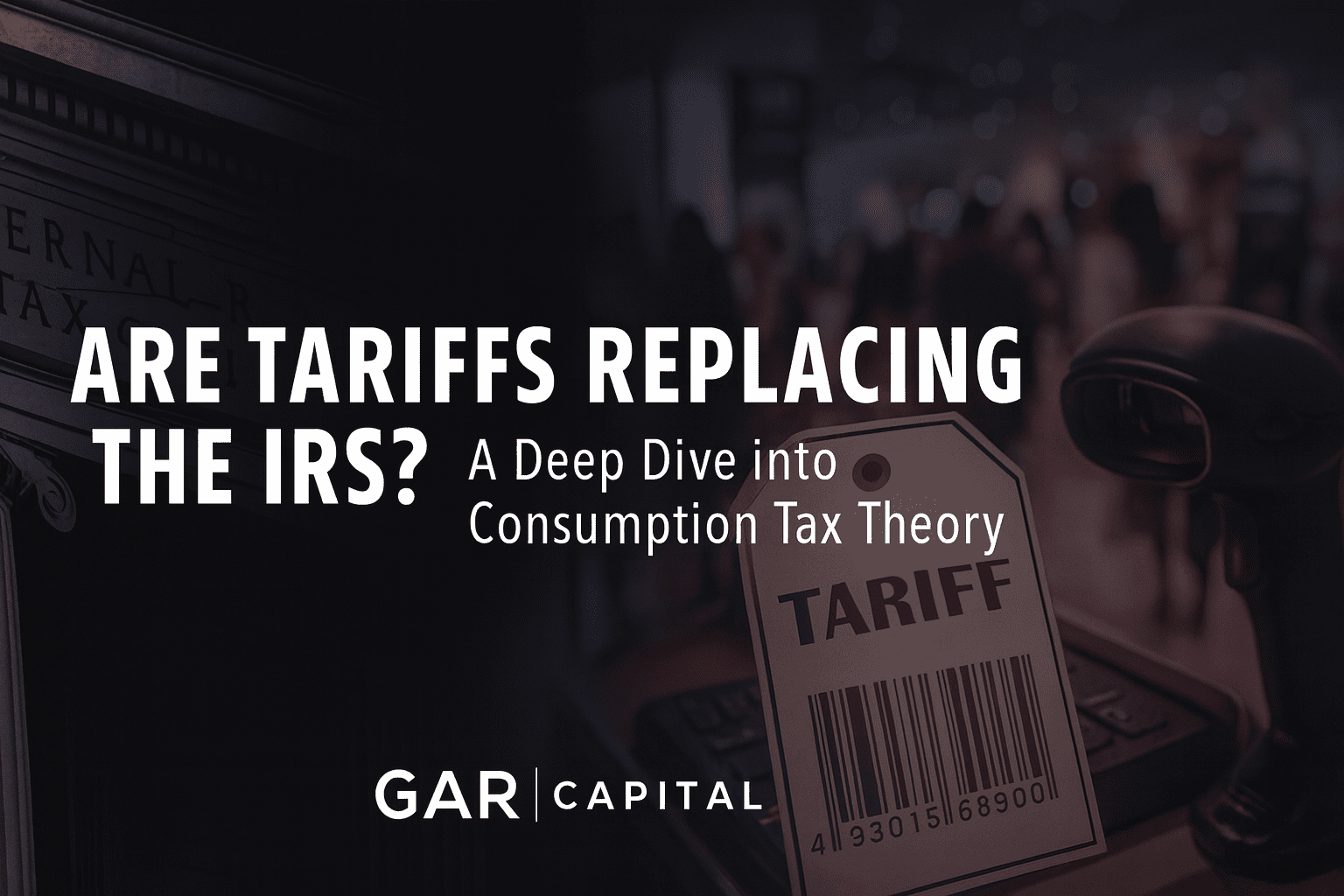Summary
GAR Capital unpacks the emerging theory that universal tariffs could act as a stealth flat tax — shifting America toward a consumption-based system while reducing the IRS’s role. Backed by populist messaging, this economic pivot may reshape how taxes are framed, collected, and politicized. From patriotic slogans to real inflation risk, here’s why traders and investors need to pay attention to this macro narrative.
Economic Data
- 📈 MSFT & META & HOOD Earnings: Jul 30, 2025
- 📈 AAPL & AMZN Earnings: Jul 31, 2025
- 📈 FOMC Meeting and Press Conference : Jul 30, 2025
- 📈 NFP Non-Farm Payroll Report: Aug 1, 2025
📚 Deep Dive 📚
🇺🇸 Tariffs: The Backdoor Flat Tax?
A Populist Economic Theory You Need to Watch
Lately, there’s been a lot of noise around tariffs, trade wars, and IRS cuts. But zoom out… and you might start seeing a bigger picture:
What if tariffs are just a backdoor flat tax?
And what if we’re slowly shifting to a consumption-based tax system without officially announcing it?
Sound wild? Let’s walk it out.
💵 Income Tax Out — Consumption Tax In?
Here’s the idea:
Instead of taxing your paycheck, the government is starting to tax what you buy. That’s the essence of a consumption tax — the more you spend, the more you pay.
Now look at what’s happening:
• Universal 10% tariffs on imports are being proposed.
• IRS “gutting” headlines are circulating — less enforcement, smaller role.
• Political rallies are pushing “Make China Pay” and “You keep your paycheck” messages.
Put it all together and you’ve got a recipe for replacing (or drastically shrinking) the income tax with something that hits at the cash register, not on April 15th.
🧠 What Tariffs Actually Are:
Tariffs aren’t just about China or trade policy — they’re a sales tax on imported goods. And like any tax, you pay for it in the form of higher prices.
So when you hear “we’re taxing foreign goods,” what it really means is:
“We’re taxing you when you buy foreign goods.”
That’s a flat tax in disguise.
It doesn’t matter if you make $30K or $3 million — if you buy an iPhone or imported car, you pay the same % markup.
🎯 Why This Works Politically:
This setup checks a lot of boxes for a populist movement:
• ✅ Patriotic framing — “We’re punishing China.”
• ✅ IRS villainization — “You shouldn’t be afraid of the taxman.”
• ✅ Flat tax simplicity — “You pay based on what you consume, not what you earn.”
• ✅ Middle-class marketing — “You keep more of your paycheck.”
It’s very effective messaging… even if the economic impact is more complicated.
📉 Who Loses in This Scenario?
Let’s be real — someone always pays.
• Consumers, especially lower-income households, will feel the price hikes.
• Small businesses that rely on imports will see margins squeezed.
• Global firms could get hit by retaliatory trade policies.
• And yes — inflation risk rises if tariffs spread too wide, too fast.
🔮 What Could Happen Next?
If this trend continues, we may be witnessing a fiscal pivot in slow motion:
🔁 From income-based taxation…
✅ Toward consumption-based taxation…
🛑 While reducing the IRS’s role…
📈 And replacing it with tariffs and point-of-sale taxation.
It’s not official policy yet, but the chess pieces are being set.
📢 Final Thought:
This theory may sound fringe right now… But if the next election cycle heats up with talk of repealing the income tax, replacing the IRS, and expanding tariffs, don’t be surprised.
It’s already happening — just not with that label.
At GAR Capital, we always try to stay five steps ahead, and this is one of those macro-level shifts that could define the next decade of U.S. fiscal policy.
Keep your eyes open, keep your charts ready — and always be asking:
Who really pays the tax?


